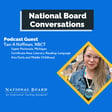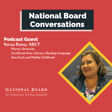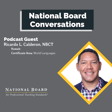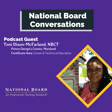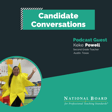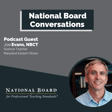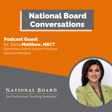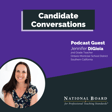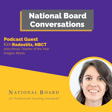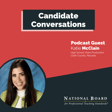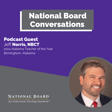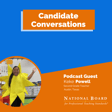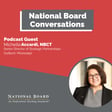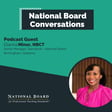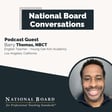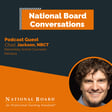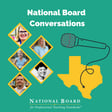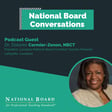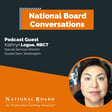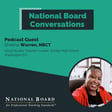Become a Creator today!Start creating today - Share your story with the world!
Start for free
00:00:00
00:00:01

Michael de la Torre
In this episode of National Board Conversations, we speak to Michael de la Torre, NBCT, about planning your National Board Journey. He's a National Board Certified Teacher and the Program Coordinator for the LAUSD Support Network. We also speak to Michael about some of the animal conservation he has done over the years.
Be sure to follow us on all our social media platforms to keep up with all National Board related updates.
Twitter: @NBPTS
Instagram: @NBPTS
Facebook: The National Board for Professional Teaching Standards
Transcript
Introduction and Guest Background
00:00:00
Speaker
Hi, I'm Eddie Santiago, the host of National Board Conversations, and on this episode, we talk to Michael De La Torre. He's a National Board Certified Teacher in Los Angeles, and he's also the Program Coordinator for the LAUSD National Board Support Network. On this episode, we get into why Michael became a teacher and offer some tips for your national board journey. So without further ado, let's welcome in Michael.
00:00:21
Speaker
Hey, Michael, how's it going today? Hey, Eddie, good. How are you doing? Pretty well, pretty well. I'm excited to be here. You know, first, Voya joined this podcast journey with the national board for myself. So, you know, I'm excited to start this talk to you. Oh, great. Great. I'm excited too. So we'll start off right off the top. Can you give a little bit of an introduction of yourself? What's your current role and what do you do? Sure. My name is Michael de la Torre. I'm the coordinator for the support network. That's a collaboration between LAUSD and UTLA, my district and my union. And I help teachers get board certified.
00:00:51
Speaker
Can you share why you became a teacher? What got you into profession in the first place?
Teaching Journey and Board Certification Motivation
00:00:55
Speaker
Yeah, so when I was in college, I did get a recruiter that called me. And at the time, it was in the, it was in 91. So a long time ago. Yeah, I'm old. And they needed bilingual teachers. And since I'm bilingual, they recruited me and so I came down to LA and started teaching.
00:01:18
Speaker
That's how I got started teaching. Nice. So where'd you move? Where'd you come down from? Where'd you go down to LA? Oh, nice. So you was up in NorCal. So why did you end up becoming a board certified teacher? Well, it wasn't available then. So, you know, as you know, in my district, we didn't know about until my district negotiated this position and this organization with the union in 1997 or 96.
00:01:45
Speaker
which is about 10 years after national board began, that started in 86. So at that time when I heard about it, I thought, hey, I want to do this because our district offered a substantial pay increase for board certified teachers. And I thought, oh, I can do it. You know, as a hotshot teacher and thinking this is next on my list, let me get another feather in my cap. So I pursued it, but actually I tried to pursue, but there was no certification for bilingual teachers at that time.
00:02:11
Speaker
So I had to wait until 2000 when they first offered the English as a new language certificate. And that's when I actually pursued. How long did it take you to finish the process?
Certification Challenges and Insights
00:02:23
Speaker
Well, I went through the first year and missed it by three points. And everyone else in my cohort did succeed. And so I had to retake. But in my retake, I did pass. So it took me two years. And there are some things that I wish I had known when I pursued that would have
00:02:42
Speaker
helped me to achieve in the first year, but it's all good. It's not a race. What were some of your initial thoughts when you started the process and you decided to take that leap and become a National Board Certified Teacher? Oh, when I first, my initial thoughts were, what if I don't pass? You know, there was the panic. It's a high stakes assessment. And I was nervous because at that time we didn't even have, we didn't have the questions available. You just had to pay and then wait until you received a mysterious box in the mail.
00:03:11
Speaker
And this box had a CD-ROM with all the questions. So it was very, you know, secretive, you know, and scary. But I was worried, worried that I, what if I didn't pass? It was expensive. You know, back then it costs more than it does now. So on a teacher's salary, that's quite a bit. It was like 2,500. And so, you know, back in the nineties, you can imagine it's a lot of money, 99, 2,000. So,
00:03:41
Speaker
But yeah, it was just a little nervous because I didn't know if I had enough to make the grade. So. What are some things you wish you had known prior to pursuing board certification? Oh, I wish I had known that it's completely based on what you do with students and not at all on programs or state standards. It really is just focused on the teacher and your response to students' needs.
00:04:08
Speaker
What did you learn along the way? I learned to collaborate with colleagues, believe it or not. So, you know, usually teaching is a private profession where you everyone works in their own classroom. So you're not used to working with others. But when I did the process in and I joined this program that I'm the coordinator now. And it was with a group of other teachers, but I didn't know how to play in the sandbox. You know, so I didn't know how to collaborate with other teachers to get work done. And as I went through, I learned how to
00:04:38
Speaker
share my expertise with others and also learn from their expertise because everyone's good at something and all of us together are better. No, I can imagine. And now in COVID, I feel like it's harder to collaborate with a lot of online schooling and a lot of kids at home or in hybrid teaching. But having those skills to know how to collaborate with one another is super helpful. Actually, I find it's easier to collaborate now with COVID.
00:05:08
Speaker
when the pandemic struck and we had to move to online program. So I had a hybrid model. I had some mostly face-to-face workshops and then some online in Canvas. And once the pandemic struck, I moved all of my candidates into the Canvas course, which is virtual. And it actually allowed for more collaboration through the use of like Google Suite with Google Docs. And so teachers were able to get together in Zoom and then share a document on screen
00:05:38
Speaker
everyone participates. So it made it virtual is actually easier to collaborate with colleagues than face to face, I think.
Tips for Certification Success
00:05:46
Speaker
So you currently lead the National Board Support Program for LAUSD. Are there any particular tips or strategies you share with teachers and counselors you work with? I yeah, lots of tips. So I tell them to work on it a little bit every day, you know, just do a little bit at a time. It's just too much to tackle all at once. You know, it's not like a
00:06:07
Speaker
It's not like a college paper you can leave till the night before and crank it out. It's nothing like that. So you really have to work on it a little bit at a time and make lots of revisions. So answer the questions, share it with colleagues, get their input and their feedback, and then revise your work. So the more you revise it, the clearer that vision will be. And that makes for a better component submission. Is there a common misstep you could see that candidates take? Yes. So a lot of candidates are so nervous.
00:06:36
Speaker
understandably, because I was nervous too when I was a candidate, that you forget that you just have to answer the questions. So the questions in the code and the components are designed to elicit specific responses. So if you just answered the question, you'll more than likely get the evidence you need. And the other thing is to make sure that what your response, that it's relevant to whatever facet you're focusing on.
00:07:02
Speaker
So in the National Board, I learned about lenses. There's a different lens that you can view every project. And so you have to view it through the National Board lens. And that makes it a lot easier. What advice do you have for educators planning their journey now? What advice would you give them going forward? In terms of pursuing National Board. Yeah, in terms of pursuing National Board now, what advice would you give current candidates? I would advise to start early. So don't wait until the last minute.
00:07:29
Speaker
I know the deadline to sign up for the national boards in late February, but that's really too late to start the program. You have to start the process early in the year. So I usually have orientations in the spring for the following school year. So definitely start early, read your standards document, read the component instructions for your certificate area and just think about it because you have to let it sink in so you understand everything and take your time. So don't rush through it.
00:07:57
Speaker
and really take your time and just answer the questions and collaborate with others so they can read your work and give you feedback. You keep talking about how much work it is and how it can be a lot and to do a little bit every day. And so it sounds like it can get very overwhelming. What are some tips you do you have there to keep educators who seem to get overwhelmed by the process? Yeah, you're absolutely right. It's a very rigorous process.
00:08:21
Speaker
So it is overwhelming if you try to do it all at once, but if you do it in manageable chunks, you know, a little bit at a time, it's not so daunting. So what I do is in my network. I do give them little mini assignments or mini deadlines of when they should complete certain parts. So if you work on it just a little bit at a time.
00:08:41
Speaker
It's not as daunting. So we're going to take this outside the classroom a little bit so we can get to know you a little bit more.
Personal Interests and Inspirations
00:08:49
Speaker
We're going to start with what kind of music were you listening to on your last playlist? So I'm a big Britney Spears fan. I know you wouldn't think it, but I just I love Britney Spears mainly because I do love her music, but I think she's a great role model.
00:09:09
Speaker
for students to see that even though she doesn't have the greatest talent like some other singers, she is still very successful because she's driven and she does what she loves. So I remember in one of her interviews, she said that she knows that she doesn't have the greatest voice like say, Christina Aguilera, but she likes the way that singing makes her feel. And so she's doing what she loves and doing what she loves, she's become so successful. And so that's inspirational for students.
00:09:38
Speaker
Because you might think, well, I'm not the best basketball player in the world. But as long as you love doing something, just go ahead and do it. You can still be successful. That's awesome. So what is your favorite kind of food? So I'm a big eater. I like all kinds of foods. But I would say my favorite would have to be like Cajun food. I like it. My sister's from New Orleans. And that's what I love when I go down there and get some good Cajun food. We just had some
00:10:08
Speaker
And I love New Orleans too. It's so, so delicious. We just had some Cajun food yesterday. So I love it. I love the spice. Exactly. I got used to it. Like my one, some, I know somebody from Houston and, uh, like I got introduced to it down there and it's been in my life. Cause I grew up in the Northeast and it's not very spicy up there. And I go down there and get introduced to spicy food and it was great. Uh, so what hobbies outside of education do you
Volunteer Work and Conservation Efforts
00:10:32
Speaker
have? Oh, my hobbies. Um, I've been a volunteer docent at the LA zoo since 1997.
00:10:38
Speaker
And so I was doing the animal show there and giving tours to zoo guests. But now with the pandemic, we can't have hands-on, so no more animal shows. Well, any good animal fun facts for us? I'm sorry? Any good fun facts about animals for us? Can you give us one? Fun facts? Well, I do have fun facts. And usually I talk about what animal we have that I'm presenting or an animal at an exhibit. But one thing that we talk about mostly is conservation efforts.
00:11:07
Speaker
And so LA Zoo, I'm really proud of the fact that we partner with all other zoos and aquariums to ensure that we conserve the species. And the California Condor is one of our big success stories because the California Condor in 1986, there were only like 22 left in the world and they were going to be extinct. So the LA Zoo partnered with San Diego Zoo and we brought the remaining Condors that were out in the wild into captivity. And we started a captive breeding program.
00:11:37
Speaker
Thankfully, we were able to successfully breed these condors. The reason they were dying out is that we were using lead in the munitions. And the lead, when the condors would eat the carcasses, they would consume the lead, which would weaken their eggs, and they couldn't sit on them to incubate them. So yeah, now there's over 400 in the wild here in California, and they're doing well. Wow. Well, what an amazing way to end this out. I appreciate your time, Michael.
Conclusion and Farewell
00:12:09
Speaker
Well there you have it, that was Marco de la Torre, such a meaningful conversation. We would like to thank him for his time and thank you for listening to National Board Conversations. Be sure to follow the National Board on all our social media platforms to keep up with any updates National Board related and we'll see you next time.
